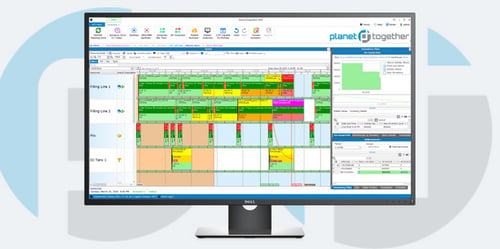Green Chemistry: A Strategic Imperative for Chemical Manufacturing Operations
As an Operations Director in a chemical manufacturing facility, you are constantly balancing production efficiency, regulatory compliance, and cost management. However, a new and pressing challenge is taking center stage: sustainability. Green chemistry is emerging as a key strategy to ensure the long-term viability of chemical manufacturing while minimizing environmental impact.
By integrating advanced planning tools like PlanetTogether with SAP, Oracle, Microsoft, Kinaxis, or Aveva, operations leaders can optimize production planning, resource allocation, and compliance management, all while embracing the principles of green chemistry.

The Growing Importance of Green Chemistry
Green chemistry focuses on designing products and processes that reduce or eliminate hazardous substances. Unlike traditional approaches that deal with waste after it is created, green chemistry proactively seeks to prevent pollution at the molecular level. This approach aligns with increasing regulatory requirements, customer expectations, and corporate sustainability goals.
For chemical manufacturers, adopting green chemistry can lead to:
Reduced regulatory burden by decreasing the use of hazardous materials.
Cost savings through lower raw material usage, waste reduction, and energy efficiency.
Enhanced market position by offering eco-friendly alternatives that appeal to sustainability-conscious consumers.
Improved safety for workers and surrounding communities.
Challenges in Implementing Green Chemistry
Despite its benefits, green chemistry presents challenges for operations teams. The key obstacles include:
Process Complexity: Transitioning to sustainable raw materials and alternative chemical processes requires significant operational changes.
Regulatory Compliance: Navigating evolving environmental regulations across different regions is complex and resource-intensive.
Supply Chain Limitations: Sourcing sustainable raw materials and ensuring supply chain transparency can be difficult.
Production Efficiency: Ensuring that green chemistry methods do not compromise production output or product quality.

Integrating PlanetTogether with SAP, Oracle, Microsoft, Kinaxis, or Aveva for Green Chemistry Success
To successfully implement green chemistry, chemical manufacturers need advanced production scheduling, planning, and data analytics to make informed decisions. This is where PlanetTogether, integrated with enterprise systems like SAP, Oracle, Microsoft, Kinaxis, or Aveva, can provide a competitive advantage.
Optimized Production Planning for Sustainable Materials
One of the biggest hurdles in green chemistry is the shift to bio-based or less hazardous raw materials. These materials often have different processing times, shelf-life constraints, and cost structures. PlanetTogether’s integration with ERP systems enables real-time adjustments in production schedules based on material availability and quality.
For example, integrating PlanetTogether with SAP allows for seamless material planning, ensuring that sustainable inputs are used efficiently while avoiding production bottlenecks.
Reducing Waste Through Smart Scheduling
Excess waste is a major concern in chemical manufacturing. By leveraging PlanetTogether’s AI-driven scheduling algorithms, operations teams can:
Minimize batch leftovers by optimizing batch sequencing.
Reduce downtime between changeovers to lower solvent and water use.
Improve material yield through real-time tracking and predictive analytics.
When PlanetTogether is integrated with Aveva’s manufacturing execution systems (MES), it enables a closed-loop approach where process data continuously refines scheduling parameters, leading to lower waste generation.
Energy Efficiency and Carbon Footprint Reduction
Energy-intensive production processes are a significant contributor to emissions in chemical manufacturing. PlanetTogether’s optimization capabilities, when linked with Microsoft Azure IoT or Kinaxis supply chain solutions, provide insights into energy consumption patterns. This allows operations managers to:
Schedule production during off-peak energy hours.
Balance workloads across energy-efficient equipment.
Implement predictive maintenance to reduce energy waste.
For example, integrating PlanetTogether with Oracle Cloud can leverage cloud-based analytics to monitor energy use in real time, making it easier to implement sustainable energy management strategies.
Regulatory Compliance and Data Transparency
Compliance with green chemistry regulations requires accurate reporting and traceability of raw materials, production processes, and emissions. PlanetTogether’s integration with ERP and MES systems ensures end-to-end visibility and compliance tracking.
By linking PlanetTogether with SAP EH&S (Environment, Health & Safety) modules, operations teams can:
Automatically track hazardous material usage and substitutions.
Generate compliance reports with minimal manual effort.
Proactively adjust production plans to align with regulatory changes.
Similarly, integration with Kinaxis supply chain planning helps ensure sustainable procurement practices by validating supplier compliance with green chemistry standards.
For Operations Directors in chemical manufacturing, green chemistry is no longer a choice—it’s a strategic imperative. By leveraging PlanetTogether's integration with SAP, Oracle, Microsoft, Kinasis, or Aveva, companies can effectively balance sustainability with operational efficiency.
Key Takeaways:
Green chemistry reduces environmental impact while enhancing profitability.
Implementation challenges can be mitigated through advanced production planning and data analytics.
Integration of PlanetTogether with enterprise systems enables real-time optimization and compliance tracking.
Chemical manufacturers that embrace this approach will be better positioned for future growth and regulatory resilience.
By embedding green chemistry into your operations strategy with smart scheduling, optimized resource use, and compliance automation, your facility can lead the charge toward a more sustainable and profitable future in chemical manufacturing.
Are you ready to take your manufacturing operations to the next level? Contact us today to learn more about how PlanetTogether can help you achieve your goals and drive success in your industry.
Topics: Sustainable Materials, PlanetTogether Software, Integrating PlanetTogether, Regulatory Compliance Automation, Cost Reduction and Resource Optimization, Chemical Manufacturing, Reducing Carbon Footprint in Logistics





















LEAVE A COMMENT